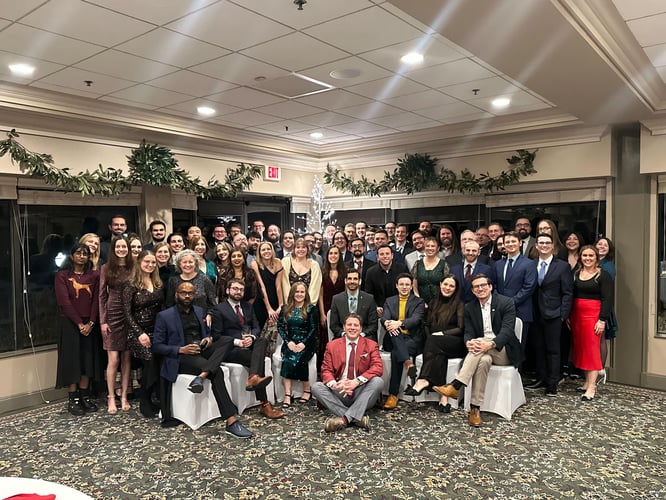Why should a VP of Revenue Operations care so much about company culture?
Because it’s one of the biggest influences in a startup’s success — or failure (especially as they scale).
If you’re a later stage startup, you might have an entire HR or People Operations team to own the culture that the founders set out to build. But for small startups who don’t have a VP of People, the onus is on everyone. And the truth is, it should always be on everyone.
But what is culture?
It’s a hard concept to grasp, because culture is the collective actions of everyone at the company. It’s every single interaction that employees have with each other, and with customers. It's the collective thought process, values, and the way things are done at the company.
That’s why culture is a key factor in driving a company forward. It affects hiring, employee engagement and retention, sales, investor relationships, and more.
The teams that achieve greatness in the long run have all cultivated a culture that fit the vision of their company, whether that culture was created consciously or subconsciously.
And in my three years at GreenLancer, a Detroit startup with the mission to accelerate the adoption of solar and other renewable energy technologies, I’ve been consciously building a culture to help us achieve that mission. The more our team grows, the more I realize what you want your culture to be doesn’t matter if you don’t know how to achieve it.
If you’re interested in improving culture and leading a purpose-driven, culture-forward team, here’s six ways to focus on the how.

GreenLancer team
Remember that culture is fluid
Companies are collections of people… and people come and go. Every new hire brings their own unique perspective, experience, and way of doing things to your company. In turn, the DNA of your culture changes. That’s a good thing - but make sure your founders and executives have an intentional conversation about what the company stands for and how it operates.
Then, when your team scales quickly, hiring managers have a north star to hire team members who support and grow the culture of the business.
Then, it’s on the team to hire through that lens in order to maintain the kind of culture that supports employees and the business.
Ask the tough questions in interviews
Culture is fluid, so who you hire for your startup is critical. You’re not just looking for a “culture fit,” you’re looking for a culture add. Someone who aligns with your company’s culture, but will offer new ideas, and challenge the team to think differently.
How do you find these people? Ask the right questions. The tough questions. The ones that will uncover their intangibles, the way they think about solving problems, resolving conflict, etc.

Here are a few of my go-to interview questions to do just that:
-
Tell me about a fulfilling project you worked on.
-
What kind of managers drain your energy? What types of projects drain your energy? What gets you excited and motivated?
-
Tell me about a time when you received difficult feedback and how you dealt with it.
-
How do you approach a new project or task that you have no experience with?
-
Tell me about a time you had a disagreement with a peer at work and how you navigated to a resolution.
These are the questions that reveal what you can’t see in a resume.
Know what people are looking for in culture: flexibility & purpose
If you want to understand what people are looking for in a company culture, just look at their values. Today, what I’m seeing consistently from candidates is that people crave flexibility.
As many companies continue to bring people back into the office more consistently, that flexibility (both for scheduling and remote work opportunities) becomes a critical piece to attracting the right talent.

GreenLancer hybrid office
That flexibility is also closely connected to work-life balance, one of the top things candidates are looking for. If you want to keep employees engaged, you have to actively prevent burnout through solid paid time off policies, flexibility policies, and a culture of empathy.
At the end of the day, people want to do meaningful, impactful work. Especially those who are looking to work at a startup. They want to be part of a mission, and they want their voice to be heard.
Build real relationships
GreenLancer has a hybrid team with employees who come into the office regularly, once in a while, and others who are nationally distributed. If you have a similar setup, you know connections can be challenging. Having a core team in office can strengthen the relationships of the team, and create a foundation to build culture from. But it’s critical that remote employees don’t get left behind.
So create space before meetings to let conversations happen organically. Reopen your lines of communication, and get to know people on a personal level. You don’t have to jump right into work all the time.
Create slack channels for people to talk about weekend plans, share Spotify playlists, or send dog photos. Whatever is interesting to your team, create the space for the team to get to know each other on that level.
Additionally, make sure you try to get the whole team together once or twice a year. Bring in your remote employees, and do things together that are not work related. Do some sort of activity (like ice climbing) or go to a baseball game. Whatever you choose to do, retreats are all about helping remote employees connect, both with each other and the rest of the team. People want to be seen as a whole person, not just Sharon from accounting.
A continuous feedback loop is key
So what happens when the culture gets off track? You right the ship with feedback.
And it’s much easier to do that if you’ve already established continuous feedback as the norm, for praise and constructive criticism.
If you’re meeting 1 on 1 with team members on a regular basis to talk openly about challenges, they have the expectation of feedback, so uncomfortable conversations become a little less...uncomfortable.
You’ll also avoid having to put the dreaded, ambiguous 15 minute meeting on a team member’s calendar out of the blue.
On the GreenLancer Revenue team, we have a consistent cadence of feedback, coaching, and mentorship. These are small day-to-day interactions that influence our culture, and those little things add up. Our Friday meetings go far beyond Revenue generating activities and KPIs; we also how we manage conflicts,our relationships with customers, and frameworks we can apply to be more effective team members. It’s all about making sure we’re rowing the boat in the same direction.
The key to getting your culture back on track after a miscue is to speak truthfully about what’s happening. It’s about resetting, refocusing on the bigger picture and placing the mission and culture front and center again. (Pro-tip: do this offsite, like at a coffee shop, to get the team out of their heads.)
Build a network of other managers and peers
It’s easy to forget this, but the truth is you’re not alone. There are countless other managers navigating the same challenges around startup culture, leadership, and growth.
One of the best things you can do is surround yourself with other managers and peers to talk to them about these things. Build your own network of people who are dealing with the same issues. Follow thought leadership podcasts, stay in tune with what the market is wanting, and do your research. Asking for help and learning from others is one of the best ways to improve yourself, and your whole team.
Creating the most effective team members goes far beyond hard skills. Many leaders get it wrong and think managing a team means delegating tasks. But a top tier culture-first leader focuses on how. How the team works together, how the team gets projects done, how the team hires, and how to best support employees.
Culture lies in the how — so does effective leadership.
About Matt Rea
 Matt is a revenue executive with over 10 years of experience leading teams at startup and growth stage companies. He is currently the VP of Revenue Operations at GreenLancer where he leads the marketing, sales, and customer success efforts of the company to grow revenue.
Matt is a revenue executive with over 10 years of experience leading teams at startup and growth stage companies. He is currently the VP of Revenue Operations at GreenLancer where he leads the marketing, sales, and customer success efforts of the company to grow revenue.
To learn more about GreenLancer, visit www.greenlancer.com. They are currently hiring! If you’re interested in working with a mission-driven organization and a supportive employee culture, check out their open roles and apply now.


.png?width=50&name=matt%20rea%20author%20(1).png)




.png?width=50&name=Erin%20Gregory%20(1).png)
